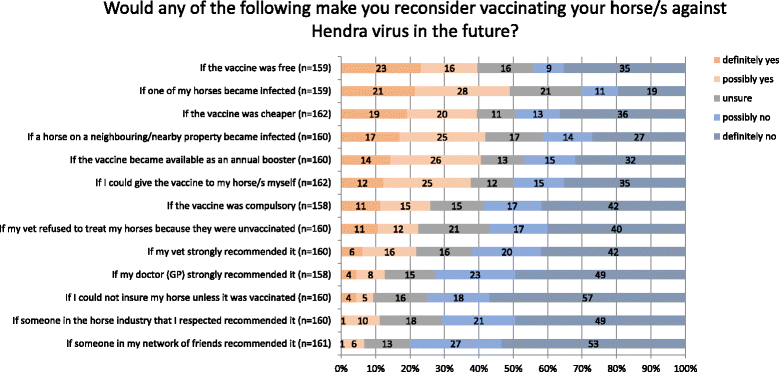"Why won't they just vaccinate?" Horse owner risk perception and uptake of the Hendra virus vaccine
- PMID: 28407738
- PMCID: PMC5390447
- DOI: 10.1186/s12917-017-1006-7
"Why won't they just vaccinate?" Horse owner risk perception and uptake of the Hendra virus vaccine
Abstract
Background: Hendra virus is a paramyxovirus that causes periodic serious disease and fatalities in horses and humans in Australia first identified in 1994. Pteropid bats (commonly known as flying-foxes) are the natural host of the virus, and the putative route of infection in horses is by ingestion or inhalation of material contaminated by flying-fox urine or other bodily fluids. Humans become infected after close contact with infected horses. Horse owners in Australia are encouraged to vaccinate their horses against Hendra virus to reduce the risk of Hendra virus infection, and to prevent potential transmission to humans. After the vaccine was released in 2012, uptake by horse owners was slow, with some estimated 11-17% of horses in Australia vaccinated. This study was commissioned to examine barriers to vaccine uptake and potential drivers to future adoption of vaccination by horse owners.
Methods: This study examined qualitative comments from respondents to an on-line survey, reporting reasons for not vaccinating their horses. The study also investigated scenarios in which respondents felt they might consider vaccinating their horses.
Results: Self-reported barriers to uptake of the Hendra virus vaccine by horse owners (N = 150) included concerns about vaccine safety, cost, and effectiveness. Reduction in vaccination costs and perception of immediacy of Hendra virus risk were reported as being likely to change future behaviour. However, the data also indicated that horse owners generally would not reconsider vaccinating their horses if advised by their veterinarian.
Conclusion: While changes to vaccine costs and the availability data supporting vaccine safety and efficacy may encourage more horse owners to vaccinate, this study highlights the importance of protecting the relationship between veterinarians and horse owners within the risk management strategies around Hendra virus. Interactions and trust between veterinarians and animal owners has important implications for management of and communication around Hendra virus and other zoonotic disease outbreaks.
Keywords: Biosecurity; Hendra virus; Protection motivation theory; Risk mitigation; Trust; Vaccination; Vaccine hesitancy; zoonosis.
Figures
Similar articles
-
Risk Mitigation of Emerging Zoonoses: Hendra Virus and Non-Vaccinating Horse Owners.Transbound Emerg Dis. 2017 Dec;64(6):1898-1911. doi: 10.1111/tbed.12588. Epub 2017 Jan 4. Transbound Emerg Dis. 2017. PMID: 28054443
-
"We've learned to live with it"-A qualitative study of Australian horse owners' attitudes, perceptions and practices in response to Hendra virus.Prev Vet Med. 2017 May 1;140:67-77. doi: 10.1016/j.prevetmed.2017.03.003. Epub 2017 Mar 12. Prev Vet Med. 2017. PMID: 28460752
-
Playing with fire - What is influencing horse owners' decisions to not vaccinate their horses against deadly Hendra virus infection?PLoS One. 2017 Jun 21;12(6):e0180062. doi: 10.1371/journal.pone.0180062. eCollection 2017. PLoS One. 2017. PMID: 28636633 Free PMC article.
-
Hendra Virus: An Update on Diagnosis, Vaccination, and Biosecurity Protocols for Horses.Vet Clin North Am Equine Pract. 2023 Apr;39(1):89-98. doi: 10.1016/j.cveq.2022.11.009. Epub 2023 Feb 1. Vet Clin North Am Equine Pract. 2023. PMID: 36737284 Review.
-
Hendra virus.Vet Clin North Am Equine Pract. 2014 Dec;30(3):579-89. doi: 10.1016/j.cveq.2014.08.004. Epub 2014 Sep 30. Vet Clin North Am Equine Pract. 2014. PMID: 25281398 Free PMC article. Review.
Cited by
-
Perceptions of Sheep Farmers and District Veterinarians towards Sheep Disease Management in New South Wales, Australia.Animals (Basel). 2024 Apr 22;14(8):1249. doi: 10.3390/ani14081249. Animals (Basel). 2024. PMID: 38672397 Free PMC article.
-
Policies to prevent zoonotic spillover: a systematic scoping review of evaluative evidence.Global Health. 2023 Nov 8;19(1):82. doi: 10.1186/s12992-023-00986-x. Global Health. 2023. PMID: 37940941 Free PMC article. Review.
-
Organising for One Health in a developing country.One Health. 2023 Aug 7;17:100611. doi: 10.1016/j.onehlt.2023.100611. eCollection 2023 Dec. One Health. 2023. PMID: 37588424 Free PMC article.
-
Langya virus outbreak: current challenges and lesson learned from previous henipavirus outbreaks in China, Australia, and Southeast Asia.Bull Natl Res Cent. 2023;47(1):87. doi: 10.1186/s42269-023-01064-3. Epub 2023 Jun 13. Bull Natl Res Cent. 2023. PMID: 37334163 Free PMC article. Review.
-
Communication Interventions and Assessment of Drivers for Hendra Virus Vaccination Uptake.Vaccines (Basel). 2023 May 4;11(5):936. doi: 10.3390/vaccines11050936. Vaccines (Basel). 2023. PMID: 37243040 Free PMC article. Review.
References
-
- Joffe H. Risk and 'the other'. New York: Cambridge University Press; 1999.
-
- Plough A, Krimsky S. The emergence of risk communication studies: social and political context. Sci Technol Hum Values. 1987;12(3/4):4–10.
-
- Wynne B. Misunderstood misunderstandings: Social identities and public uptake of science. In: Misunderstanding Science? The public reconstruction of science and technology. edn. Edited by Irwin A, Wynne B. Trowbridge, Wiltshire: Cambridge University Press; 1996: 19-46.
-
- Sandman P. Responding to community outrage: Strategies for Effective Risk Communication. American Industrial hygiene Association; 2012. petersandman.com/media/RespondingtoCommunityOutrage.pdf.
MeSH terms
Substances
LinkOut - more resources
Full Text Sources
Other Literature Sources
Medical



